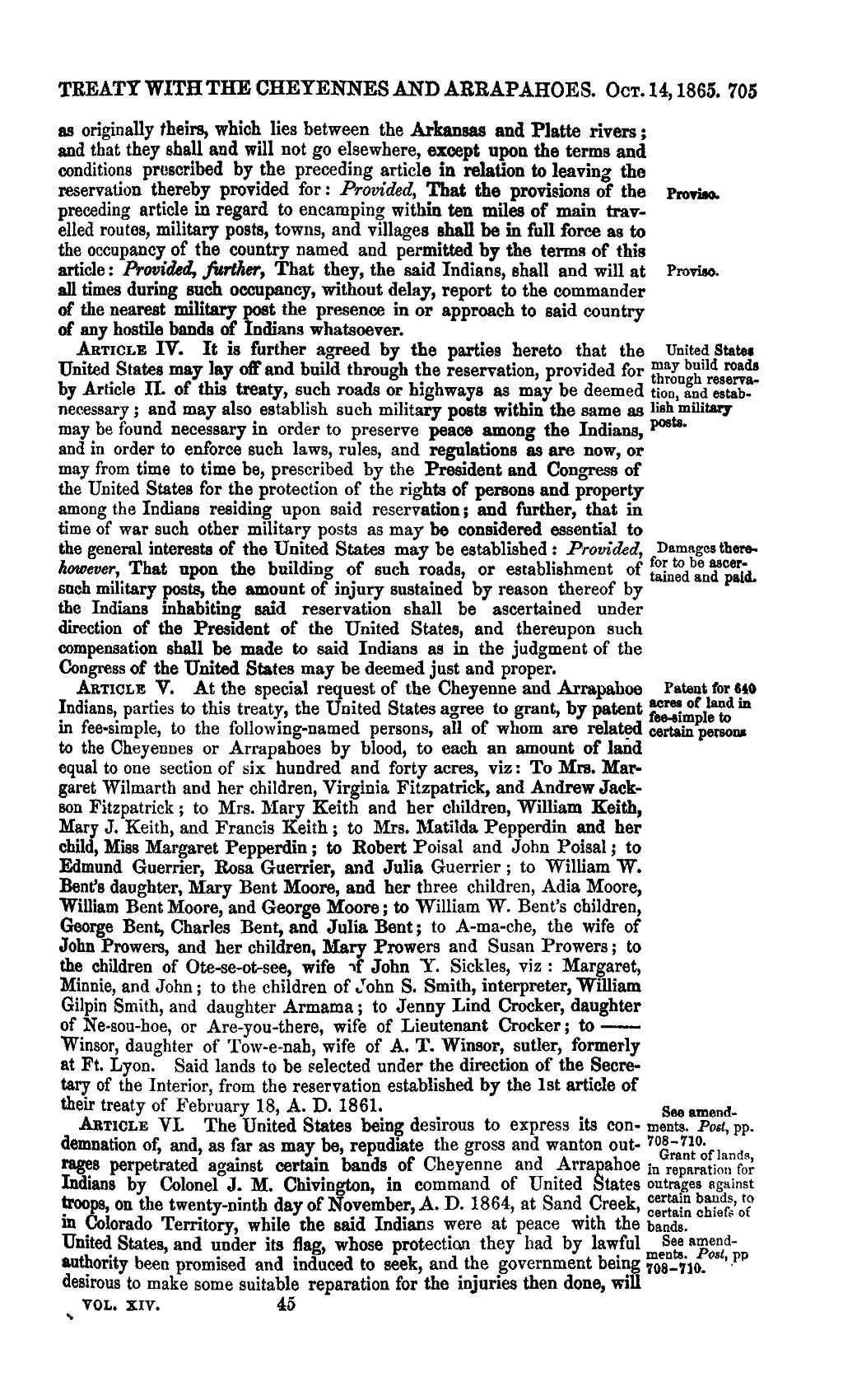TREATY WITH THE CHEYENNES AND ARRAPAHOES. OCT. 14, 1865. 705 as originally theirs, which lies between the Arkansas and Platte rivers; and that they shall and will not go elsewhere, except upon the terms and conditions prescribed by the preceding article in relation to leaving the reservation thereby provided for: Provided, That the provisions of the pm';,,, preceding article in regard to encamping within ten miles of main travelled routes, military posts, towns, and villages shall be in full force as to the occupancy of the country named and permitted by the terms of this article: Provided, further, That they, the said Indians, shall and will at Pmviso. all times during such occupancy, without delay, report to the commander of the nearest military post the presence in or approach to said country of any hostile bands of Indians whatsoever. Anrrcnn IV. It is further agreed by the parties hereto that the United states United States may lay of and build through the reservation, provided for §‘l$gub;‘1‘L‘;s;°“d' by Article II. of this treaty, such roads or highways as may be deemed non, gm: star;. necessary; and may also establish such military posts within the same as mh mmm2V may be found necessary in order to preserve peace among the Indians, P""' and in order to enforce such laws, rules, and regulations as are now, or may from time to time be, prescribed by the President and Congress of the United States for the protection of the rights of persons and property among the Indians residing upon said reservation; and further, that in time of war such other military posts as may be considered essential to the general interests of the United States may be established : Provided, D¤m==g¤¤ therehowwer, That upon the building of such roads, or establishment of €g{¤t§db:nQ“:,?`ik_ such military posts, the amount of injury sustained by reason thereof by the Indians inhabiting said reservation shall be ascertained under direction of the President of the United States, and thereupon such compensation shall be made to said Indians as in the judgment of the Congress of the United States may be deemed just and proper. Anricmc V. At the special request of the Cheyenne and Arrapahoe Patent for eso Indians, parties to this treaty, the United States agree to grant, by patent Qgflm “* in fee-simple, to the following-named persons, all of whom are related mmm28mm to the Cheyennes or Arrapahoes by blood, to each an amount of land equal to one section of six hundred and forty acres, viz: To Mrs. Margaret Wilmarth and her children, Virginia Fitzpatrick, and Andrew Jackson Fitzpatrick; to Mrs. Mary Keith and her children, William Keith, Mary J. Keith, and Francis Keith; to Mrs. Matilda Pepperdin and her child, Miss Margaret Pepperdin; to Robert Poisal and John Poisal; to Edmund Guerrier, Rosa Guerrier, and Julia Guerrier; to William W. Bent’s daughter, Mary Bent Moore, and her three children, Adia Moore, William Bent Moore, and George Moore; to William W. Bent’s children, George Bent, Charles Bent, and Julia. Bent; to A-ma-che, the wife of John Prowers, and her children, Mary Prowers and Susan Prowers; to the children of Ote—se-ot-see, wife if John Y. Sickles, viz: Margaret, Minnie, and John; to the children of John S. Smith, interpreter, William Gilpin Smith, and daughter Armama; to Jenny Lind Crocker, daughter of Ne·sou-hoe, or Are-you-there, wife of Lieutenant Crocker; to —-— Winsor, daughter of Tow-e·nah, wife of A. T. Winsor, sutler, formerly at Ft. Lyon. Said lands to be selected under the direction of the Secretary of the Interior, from the reservation established by the lst article of their treaty of February 18, A. D. 1861. Su, ,,mm,d_ Anuom: VI. The United States being desirous to express its con- ments. Post, pp. demnation ot, and, as far as may be, repudiate the gross and wanton out- 7°g;a7l°-fhmdg Hges perpetrated against certain bands of Cheyenne and Arrapahoe in ,,p’;_,,°;,p,,,,~g} Indians by Colonel J. M. Chivington, in command of United States outrages against f1‘00pS, 0n the twenty-ninth day of November, A. D. 1864, at Sand Creek, Simi: ggfxjg ln Colorado Territory, while the said Indians were at peace with the bands, United States, and under its iiag, whose protection they had by lawful S2 ¤$°*;d· nnthority been promised and induced to seek, and the government being i,°i,°§'[·j]0_°° ’-pp desirous to make some suitable reparation for the injuries then done, will vo:.. xiv. 45
